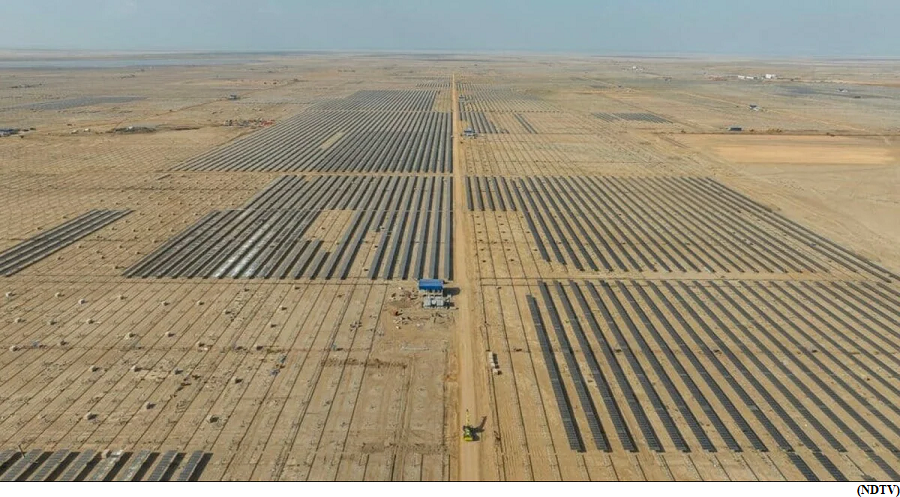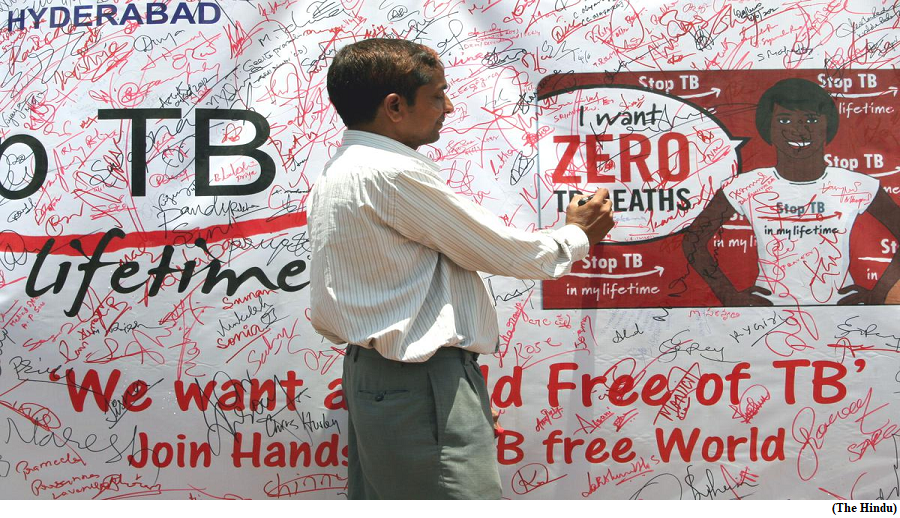India biggest energy project will be visible from space (GS Paper 3, Science and Technology)

Why in news?
- In an ambitious stride towards sustainable energy, India is constructing the world's largest renewable energy project in the Rann of Kutch.
- This colossal undertaking will further India's plans to shift to renewable energy sources, and could be visible from space.
Details:
- The project, sprawling over 726 square kilometers is expected to generate a staggering 30 gigawatts (GW) of power. This output is enough to light up over 20 million homes, marking a significant leap in meeting the country's burgeoning energy demands while adhering to environmentally friendly practices.
- Located just 150 kilometers away from the site, in Mundra, is another groundbreaking initiative. Here, India is developing one of the world's most extensive and integrated renewable energy manufacturing ecosystems, focusing on both solar and wind energy components.
- This facility underscores India's dedication to creating a self-reliant energy infrastructure and its active role in the International Solar Alliance.
Khavda renewable energy park:
- The Khavda renewable energy park, named after the nearest village to the project site, is a is an example of India's journey towards an Atmanirbhar Bharat, or a self-sufficient India.
- The Indian government has estimated the cost of this mammoth project at least $2.26 billion, reflecting the scale and significance of the investment in the nation's future.
- This green energy park is not just about generating electricity; it represents a pivotal moment in the global shift towards renewable sources.
- It aligns with the discussions and goals set forth at the ongoing COP28 climate summit, where shifting to renewable energy remains a key issue.
Way Forward:
- Upon completion, the Khavda project will stand as the world's largest green energy park, as India combats climate change and lead by example in the international community.
Commonwealth releases military justice principles
GS Paper 2, International Organisation)
Why in news?
- The Commonwealth Secretariat published the Stellenbosch Draft of the ‘Commonwealth Military Justice Principles’, comprising 10 basic principles that outline the bare minimum expectations from any system of military justice.
- These pertain to adherence to the principles of separation of powers, rule of law, impartiality, independence and competence of adjudicators and prosecution, rights of the accused, open-access, and appellate rights.

Details:
- Signed in Stellenbosch town of South Africa, the draft seeks to “reaffirm” and “reiterate” the Commonwealth’s belief “that an independent, effective, and competent legal system is integral to upholding the rule of law”.
- The draft further aims to “recognise” the unique roles military justice systems play to reflect the nature of the armed forces defending their nations and international security.
- The Commonwealth is an international body comprising 56 nations, including India, that promotes democracy, good governance, peace and the rule of law.
Key Highlights:
- The principles laid down in the Stellenbosch Draft state that when it comes to military justice, it must be ensured that the law and procedure relating to military justice are reviewed at regular intervals to ensure their compliance with best practices and developments in international domestic jurisdictions.
- They pertain to the categories of military justice, judges in military courts, non-judicial members in military courts, jurisdiction, prosecution, protection of victims, rights of accused, open and accessible proceedings, executive review and appeals and summary proceedings.
- The principles further aim to enhance the support for discipline, operational effectiveness and morale of the armed forces, to extend the laws of the country to personnel outside the relevant country’s general jurisdiction, and to ensure accountability and compliance with international and domestic law.
Committee of experts:
- The military principles have been drafted and signed by a 15-member “committee of experts”, comprising two Indian lawyers; Major Navdeep Singh (retd) and Aishwarya Bhati who have a background in military law.
- For the formulation of the military principles, a five-member global advisory committee was constituted by the Commonwealth Secretariat earlier this year and a 10-member global consultation group was thereafter constituted on the recommendations of the advisory committee.
Way Forward:
- The Stellenbosch principles are expected to be a valuable resource for legal, judicial, academic and public policy guidance.
Improved drug regimens for TB likely to reduce treatment time
GS Paper 2, Health)
Why in news?
- At the Union World Conference on Lung Health 2023, there was much optimism, as four new improved drug regimens that could cut treatment time for drug resistant tuberculosis by up to two thirds, were the primary source of this optimism.
- It is the long duration of treatment, and subsequent drug toxicity that leads to patients being unable to tolerate the drugs, and also non-compliance with treatment schedules. This ultimately leads to drug resistant TB.

New Regimens:
- On the opening day of the Union World Conference, three regimens were presented, as having achieved favourable outcomes in between 85-90% of participants for treatment of multidrug-resistant tuberculosis or rifampicin-resistant tuberculosis (MDR/RR-TB).
- Research led by Médecins Sans Frontières, Partners in Health, and Interactive Research and Development, found that a further fourth regimen showed a strong treatment response at 85.6% and represented an alternative for people who cannot tolerate bedaquiline or linezolid.
Outcome:
- These drug regimens for MDR/RR-TB “represent similar efficacy and safety to conventional treatments, but have reduced treatment time by up to two-thirds.”
- Over 750 participants from 11 sites, 7 countries, and 4 continents were involved in the study , funded by Unitaid, on tackling MDR/RR-TB.
- The trial showed how combining antibiotics in new ways could treat this form of the disease more effectively than ever before, offering much-needed hope.
Way Forward:
- The researchers findings are a significant step and could address issues around access to and affordability of quality TB care, experts agree.




